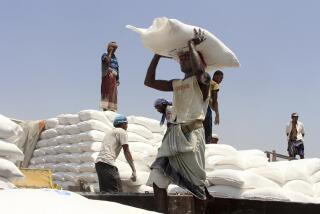NEWS ANALYSIS : Cambodian Peace Shaping Up as Expensive Outing for U.N.
- Share via
BANGKOK, Thailand — While optimism has flowed about the possibility of a peace settlement in Cambodia by October, a new concern--money--is moving to the forefront of the complex international negotiations.
All four factions in Cambodia’s civil war have now agreed on the need for a United Nations presence in the country to supervise a cease-fire and keep the peace during a transition period leading up to a free election.
But with last week’s agreement during talks in the Thai beach resort of Pattaya for the four factions to demobilize 70% of their armies and to confine the remainder of their troops and weapons to U.N.-supervised camps, the enormous dimensions of the future U.N. presence are finally beginning to take shape.
“We’re talking about thousands of U.N. troops and billions of dollars in expenses,” said a European official. “The fundamental issue is: Will the United States and the West spend billions of dollars to enforce an agreement, which is essentially between the world’s last two Communist powers, Vietnam and China?”
The official was referring to the recent warming in relations between Beijing and Hanoi, which has been widely credited with breaking a negotiating impasse between the Vietnamese-backed Phnom Penh government and a Chinese-supported coalition of three resistance groups.
A senior U.S. official who attended the talks said it was likely that the U.N. role in Cambodia would be the largest peacekeeping operation ever carried out by the world body. But, the official said, not one of the five permanent members of the Security Council nor any member of Congress “has said, ‘Let’s not do this because it’s too expensive.’ ”
While it has been widely suggested that Japan may finance a substantial part of the U.N. role in Cambodia, a Japanese diplomat at the Pattaya talks said his government was committed to funding only its proportional share, based on the standard U.N. formula.
The proposed U.N. Transitional Authority in Cambodia is likely to dwarf the U.N.’s costly, enduring presence in the Middle East, where it maintains separate forces in Lebanon, Israel, Syria and Egypt.
What concerns Western officials about the proposed partial demobilization is the dawning realization that the commitment of U.N. troops will have to increase exponentially over a previous plan calling for complete demobilization.
While a complete dismantling of armies is relatively easy to monitor, partial demobilization will require a massive effort at military census-taking, besides the vastly increased demand for troops to guard and maintain each special camp holding the remaining 30% of each faction’s forces.
Current unofficial estimates put the number of regular troops in the country at almost 100,000 for all factions, suggesting that 30,000 will remain in camps after a peace agreement is implemented. They must be housed, fed and their weapons stored.
One diplomat who attended last week’s talks said the new formula meant that U.N. troops would be potentially caught between opposing armies. Under U.N. rules, they would have to be present in sufficient numbers to deter an attack.
Besides providing peacekeeping troops and cease-fire monitors, the U.N. is considering dispatching civilian advisers to run key ministries, such as Defense and Interior, as well as taking charge of the national police.
A proposal to conduct internationally supervised elections on a constituency basis (something like U.S. congressional elections), rather than a proportional vote (which awards a simple percentage of seats based on votes cast) appears likely to be vastly more expensive to implement. The question of elections is the last remaining hurdle to a comprehensive settlement. It is expected to be resolved in informal talks by Cambodia’s governing Supreme National Council at the U.N. later this month.
Another factor likely to contribute to the enormous cost of a Cambodian settlement is the poor state of infrastructure in the country after two decades of war. There is only one first-class hotel in Phnom Penh; the remaining hotels together could barely house 500 people.
Few Western officials will be able to communicate with Cambodian bureaucrats because few outsiders speak Cambodian and few Cambodians speak any foreign language, thanks in part to a Khmer Rouge effort in the 1970s to exterminate “intellectuals.”
There are so few food and technical resources that the U.N. will have to import virtually all of its needs. The country’s roads and telephones have all but disappeared, meaning that most of that infrastructure will have to be rebuilt at U.N. expense.
If these concerns are not formidable enough, there are 350,000 Cambodian refugees camped on the Thai border waiting to return home when a peace agreement is signed. One U.N. official said $30 million has been earmarked for preparations to send the refugees home and $100 million more will be needed later.
Economists worry about what the impact on Cambodia’s fragile economy will be when thousands of relatively prosperous Canadians, Australians and French, to name just a few countries considering a role in Cambodia, arrive and begin spending money. “The possibility of hyper-inflation is painfully real,” said a Western aid official.
Even under a U.S.-led international economic embargo, rental prices for homes in Phnom Penh have shot up to $2,000 a month because of a relatively brisk demand from international aid agencies. The average Cambodian bureaucrat makes about $15 a month.
One question still unanswered is how long such a costly U.N. presence would be maintained in Cambodia. Some estimates suggest it will take two years to get from the signing of a peace agreement to the completion of elections. At a press conference last week, Prince Norodom Sihanouk, head of the transitional council, said he would like to see the U.N. presence maintained in his country for at least five years after an election.
More to Read
Sign up for Essential California
The most important California stories and recommendations in your inbox every morning.
You may occasionally receive promotional content from the Los Angeles Times.













